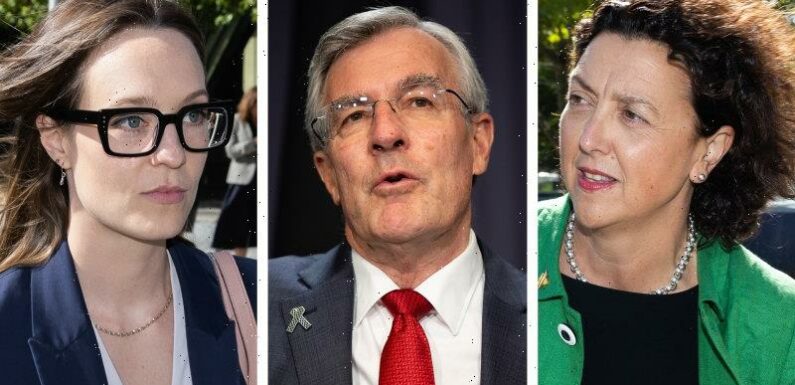
Attorney-General Mark Dreyfus has become personally involved in the high-profile workplace dispute between independent MP Monique Ryan and her former chief of staff, Sally Rugg, headed for trial in the Federal Court.
The involvement of the nation’s chief law officer in the case – which is centred around whether Rugg was mistreated for refusing to work “unreasonable hours” – reflects the potential significance for other government and public service employees who routinely work excessive hours. It also appears to have made the prospect of a pre-trial settlement unlikely.
Mark Dreyfus has become personally involved in the dispute between Independent MP Monique Ryan (left) and her former chief of staff Sally Rugg (right). Credit:Jason South/Alex Ellinghausen
As the minister responsible for overseeing the case, Dreyfus is at arm’s length from any negotiations between the parties, but his approval is required for any settlement. Multiple sources with knowledge of the case said the Commonwealth rejected a proposal from Rugg’s legal team to resolve the dispute for about $280,000.
“It was a big amount,” a source familiar with the Commonwealth’s thinking said.
Maurice Blackburn partner Josh Bornstein, who is acting for Rugg, and Sparke Helmore Lawyers partner Brendan Charles, who is acting for the Commonwealth, declined to comment.
Dreyfus’ spokesman said the matter was being conducted by the Commonwealth’s insurer and would not comment further because it was still before the courts.
Justice Debra Mortimer has flagged the trial will be heard in July at the earliest and could run for up to three weeks.
The outcome will turn on a rarely tested provision in employment laws that gives people the right to refuse to work unreasonable additional hours and how the judge reconciles Ryan and Rugg’s conflicting accounts of their time working together. Rugg has alleged a series of hostile acts by Ryan, which Ryan has denied.
“The reliability and credibility of their evidence about what happened during the five months of the employment relationship is going to be critical to the outcome of the proceeding,” Justice Mortimer said.
Sources from the Rugg and Ryan camps have expressed frustration that a settlement has not been reached despite the court setting aside a month for meditation. A preliminary hearing on whether Rugg could return to work while waiting for her case to be tried triggered the release of duelling affidavits which contained details embarrassing to both women.
These include Rugg’s decision to board a commercial flight from Canberra to Melbourne within hours of testing positive to COVID and, according to Rugg, Ryan’s ambition to become prime minister and her expectation that her staff should work as hard as she needed them to.
Ryan subsequently said she was joking about wanting to become PM. Rugg said she was advised to go home by a doctor because of a serious reaction to a previous COVID illness, wore a mask on the plane and sat away from other passengers. She also said a young child was present in her Canberra accommodation, making it unsuitable to stay in.
Although Rugg’s dispute is with Ryan, her claim is principally against the Commonwealth, which employed her as an adviser in Ryan’s office on a base salary of $136,605.
When Rugg filed her claim, Special Minister of State Don Farrell was given oversight of the case. Dreyfus became the lead minister once the government’s Office of Legal Services Co-ordination judged that the issues raised in the case had implications across government. The OLSC is housed within the Attorney-General’s department.
Now that the case will go to trial, the Labor government will face having to defend workplace arrangements that require people to work nearly twice the standard, eight-hour day.
Although Ryan has disputed some of Rugg’s claims about the hours she worked and denied she required or expected her to work the hours claimed, it has been agreed upon that when parliament was sitting, Rugg worked 70-hour weeks. Rugg’s work hours in Melbourne have been heavily disputed and Ryan’s lawyers intended to use swipe card data as evidence.
Ryan in October last year told The Australian newspaper, that a 70-hour week was unavoidable but the workload was not healthy. “I think it is only a matter of time before we have a poor outcome with one of our staff members,” she said.
Sex Discrimination Commissioner Kate Jenkins in her “Set the Standard” 2021 report into the parliamentary workplaces, identified long and irregular hours as a risk factor for workplace bullying, sexual harassment and sexual assault.
Jenkins said working such long hours also led to exhaustion, disproportionate reactions, reduced ability to cope with stress and more mistakes.
Cut through the noise of federal politics with news, views and expert analysis from Jacqueline Maley. Subscribers can sign up to our weekly Inside Politics newsletter here.
Most Viewed in Politics
From our partners
Source: Read Full Article
